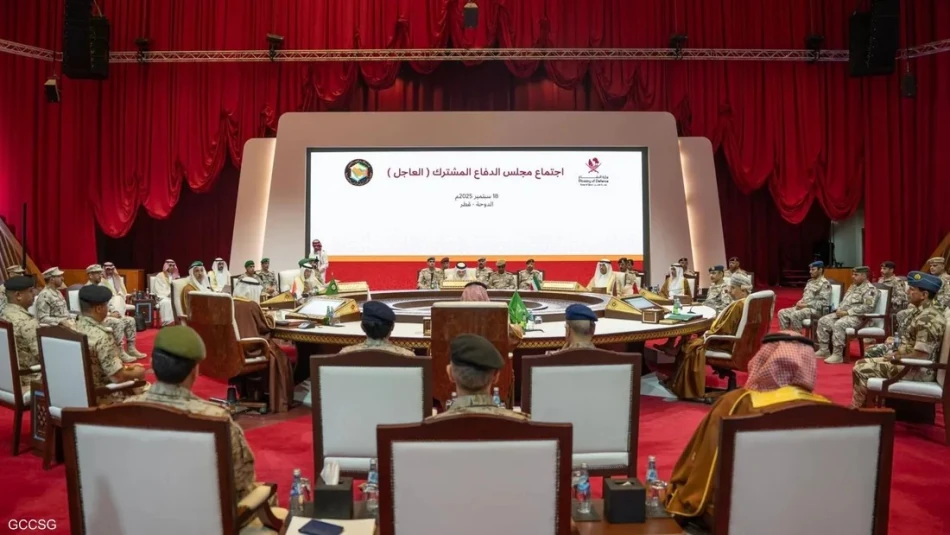
Gulf Defense Council Unveils 5 Crucial Decisions at Extraordinary Doha Meeting
Gulf States Rally Behind Qatar After Israeli Military Strike, Accelerate Joint Defense Integration
The Gulf Cooperation Council's Joint Defense Council convened an emergency session in Doha following what it characterized as a serious Israeli military aggression against Qatar's sovereignty. The extraordinary meeting resulted in five concrete defense measures, including accelerated intelligence sharing and joint military exercises, signaling a new phase of Gulf military integration amid escalating regional tensions.
Unprecedented Solidarity Response
Defense ministers from all six GCC states gathered under the chairmanship of Sheikh Saud bin Abdulrahman bin Hassan Al Thani, Qatar's Deputy Prime Minister and Minister of State for Defense Affairs. The council's response was notably swift and unified, declaring that "an attack on Qatar is an attack on all GCC states."
This represents a significant evolution from the 2017-2021 Gulf crisis when Qatar faced a blockade from three fellow GCC members. The current solidarity demonstrates how external threats can rapidly reshape regional alliances, particularly as Gulf states increasingly view Iran and its proxies as existential challenges requiring collective response.
Strategic Implications for Regional Security
Qatar's Mediator Role Under Fire
The council specifically condemned the attack as undermining Qatar's diplomatic mediation efforts for a Gaza ceasefire and hostage release negotiations. This targeting of Qatar's neutral mediator status could have profound implications for Middle East diplomacy, potentially eliminating one of the few remaining channels for indirect Israeli-Hamas communication.
Qatar has invested heavily in its role as a regional mediator, hosting Taliban offices, facilitating prisoner exchanges, and maintaining dialogue channels with various militant groups. An attack on this infrastructure represents a strategic shift that could close diplomatic avenues across multiple conflicts.
Defense Integration Acceleration
The five immediate measures adopted reveal the GCC's military priorities:
Enhanced Intelligence Sharing: Increased information exchange through the Unified Military Command suggests Gulf states are moving beyond symbolic cooperation toward operational integration. This mirrors NATO's Article 5 collective defense principle, though without formal treaty obligations.
Integrated Air Defense: Plans to share real-time airspace imagery across all GCC operations centers would create a unified air defense network. This system could prove crucial against drone and missile threats that have increasingly targeted Gulf infrastructure, from the 2019 Aramco attacks to recent Houthi strikes.
Ballistic Missile Warning System: Acceleration of the joint early warning system against ballistic missiles addresses a critical vulnerability. Iran's missile capabilities have grown substantially, with demonstrated range to strike anywhere in the Gulf region.
Market and Economic Ramifications
Defense contractors specializing in integrated air defense systems likely stand to benefit from this accelerated cooperation. Companies like Raytheon, Lockheed Martin, and European missile defense specialists could see increased demand as Gulf states standardize and link their defensive capabilities.
The energy sector faces mixed implications. While enhanced Gulf military cooperation could stabilize oil and gas supplies by deterring attacks on infrastructure, the escalating regional tensions that prompted this response create underlying volatility. Qatar's position as the world's largest LNG exporter makes any threat to its territory a global energy security concern.
Comparative Regional Dynamics
This GCC response parallels similar defense integration efforts worldwide, but with key differences. Unlike NATO's decades-long institutional development, Gulf defense cooperation is accelerating rapidly under immediate threat pressure. The Abraham Accords created a precedent for rapid Middle Eastern realignments, and this crisis may produce another such shift.
The timing coincides with broader regional recalibration as traditional security guarantors like the United States signal reduced Middle East engagement. Gulf states increasingly recognize they must provide their own security architecture, making incidents like this potential catalysts for deeper integration.
Looking Forward: Integration Under Pressure
The planned joint air defense exercises over the next three months will test whether Gulf states can move from political declarations to operational reality. Previous GCC military cooperation has often remained largely symbolic, but external pressure could drive genuine integration.
Success would create the Middle East's first truly integrated defense network outside of Israel, potentially reshaping regional power dynamics. Failure could expose the limitations of Gulf cooperation and encourage further testing by regional adversaries.
The incident also raises questions about escalation management. If Gulf states genuinely implement collective defense principles, future attacks on any member could trigger region-wide military responses, dramatically raising the stakes for any potential aggressor.
Most Viewed News

 Sara Khaled
Sara Khaled






